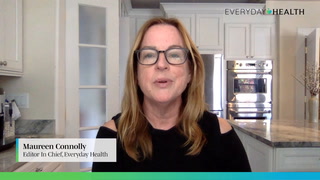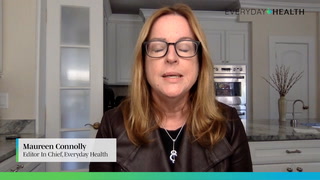A Guide to Living With Crohn’s Disease and Ulcerative Colitis During the COVID-19 Pandemic: Help, Resources, and Making a Personal Checklist


The current coronavirus pandemic can be scary for almost everyone — and especially for people with chronic health conditions like Crohn’s disease and ulcerative colitis (UC). Having Crohn’s or UC means you may already be worrying about your health, as you manage or try to avoid flares of your disease. Now you may wonder if having Crohn’s or UC puts you at higher risk for contracting COVID-19 (the disease caused by the virus) or having a more severe form of the disease.
While researchers will almost certainly learn more about the relationship between inflammatory bowel disease (IBD) — Crohn’s and UC — and COVID-19 in the coming months, there’s a lot that we already know about how people with Crohn’s and UC tend to fare if they get sick with this disease. Gastroenterologists have been treating people with Crohn’s and UC during the pandemic, and have found ways to ensure that people with these conditions receive the best care possible while minimizing their COVID-19 risk.
RELATED: 12 Questions About Reducing COVID-19 Anxiety, Answered
Managing Chronic Diseases During the COVID-19 Pandemic

How Contracting COVID-19 May Affect Crohn’s and UC
What we know so far about how COVID-19 affects people with Crohn’s and UC, and about risks for developing the viral illness and its complications in this group, is based mostly on voluntary reports from doctors to a database called SECURE-IBD. While there is a lot that we know based on this data, there are limits to what kind of information this database can provide.
Does Having Crohn’s or UC Put You at Higher Risk of Contracting COVID-19?
So far, “there is no evidence that IBD patients are more susceptible to catching COVID-19,” says Russell D. Cohen, MD, a gastroenterologist and the director of the inflammatory bowel disease center at University of Chicago Medicine.
Dr. Cohen notes that from the very beginning of the COVID-19 outbreak in China, gastroenterologists and other doctors who see patients with Crohn’s and UC recommended strict social distancing and saw no increased risk of contracting the viral disease in this group. Now, with a more comprehensive worldwide database of reports, there’s still no reason to believe the infection risk for COVID-19 is greater in people with IBD. But this may be due to better distancing measures in this group, and the database doesn’t directly address the risk of contracting COVID-19 — instead focusing on outcomes in people who get the infection.
As access to testing for the new coronavirus expands in the United States, it’s possible that researchers will find that certain groups have been less likely than others to get tested and get counted as a positive case of COVID-19.
Are There Extra Safety Precautions People With Crohn’s and UC Should Take to Avoid Exposure?
The recommended precautions for people with Crohn’s and UC are similar to those for the general population, says Cohen. That means limiting contact with other people by following social distancing guidelines, wearing a mask in public spaces, and washing your hands frequently and thoroughly.
If you fall in a high-risk group for severe COVID-19 because of the medications you take for Crohn’s or UC or based on other health conditions or your age, then it’s especially important to limit contact with people outside your household — and to be cautious within your household if other family members aren’t consistently following distancing and hygiene guidelines.
How Will Crohn’s and UC Be Affected if You Test Positive for COVID-19?
Right now, there is no evidence that COVID-19 causes attacks of Crohn’s and UC, says Cohen. But in some people, the viral disease may have gastrointestinal symptoms. These symptoms “are typically not those seen with IBD” such as diarrhea, Cohen notes, and are more likely to be tied to failure to eat or loss of appetite.
It’s important to recognize the typical symptoms of COVID-19 — including fever, difficulty breathing, and coughing — so that if you suspect the viral disease, you don’t assume that any digestive upset you experience is due to your Crohn’s or UC.
Your Crohn’s and UC Treatment Checklist During This Pandemic: How to Be Prepared
The goal for everyone, including people with Crohn’s and UC, should be to avoid contracting COVID-19 by following the recommendations of health authorities. But it’s also important to be prepared in case you do develop the disease, and to stay in touch with your healthcare team if it happens.
Are There Changes to Formal Crohn’s and UC Treatment Guidelines to Follow?
Medical organizations that are relevant to Crohn’s and UC — such as the American College of Gastroenterology, the Crohn’s & Colitis Foundation, and the American Gastroenterological Association — have issued a number of guidelines aimed at limiting the spread of the infection — such as new protocols and more protective equipment for endoscopic procedures. There is also evidence that limiting the use of corticosteroids may be advisable, and that doctors should consider using other options to treat IBD disease flares.
As in many other areas of medicine, many gastroenterologists now use telemedicine for appointments whenever possible. It’s important to keep up with regular appointments for your Crohn’s or UC, and to notify your doctor if there are any changes in your symptoms.
A Top Pharmacist's Tips for Safely Ordering Meds Online

Are There Any Prescribed Medications That May Now Be Unsafe to Take Due to COVID-19?
As noted in a report based on the SECURE-IBD database, published in May 2020 in the journal Gastroenterology, the data suggests that people who take a TNF inhibitor drug for Crohn’s or UC — such as Humira (adalimumab), Remicade (infliximab), or Cimzia (certolizumab) — are at no higher risk for severe COVID-19 than people with Crohn’s and UC who don’t take one of these drugs. In fact, early data suggests that people who take these drugs may even have better outcomes if they get the infection.
The same report, however, found that high-dose corticosteroid treatment for Crohn’s and UC was associated with worse outcomes in people who contracted COVID-19, including hospitalization, intensive care, needing mechanical assistance to breathe, and death. Worse outcomes were also seen in people who took first-line drugs like mesalamine, sulfasalazine, or budesonide for their IBD. Overall, the data “indicates that patients should consider using steroid-sparing treatments whenever possible,” says Erica Brenner, MD, a fellow in pediatric gastroenterology at the University of North Carolina School of Medicine in Chapel Hill and a coauthor of the report.
But Dr. Brenner emphasizes that in some people, the benefits of taking corticosteroids for a flare of Crohn’s or UC may outweigh the risks of worse outcomes if you contract COVID-19. Talk to your doctor about this risk if you’re concerned about taking steroids for your Crohn’s or UC.
What Resources Are Available if You Can No Longer Afford Your Medications?
A number of resources may help you access medications for Crohn’s and UC if you’ve lost income or your health insurance because of the economic fallout from COVID-19. Talk to your doctor about your situation if this applies to you. Your doctor’s office may be able to help you apply for prescription assistance programs, or directly access such programs on your behalf for in-office drug infusions.
Most major drug manufacturers offer some type of patient assistance program. You can find more information about this by visiting the official website of any drug you take and looking for links related to financial assistance.
Other potentially useful resources include NeedyMeds, which offers a drug discount card, and RxAssist, which has a searchable database of Crohn’s and UC assistance programs for drugs. There’s also a list of financial resources compiled by the Crohn’s & Colitis Foundation.
What Can Someone With Crohn’s or UC Take to Safely Boost Their Immune System?
The most important steps to keeping your immune system healthy, and protecting yourself against COVID-19, include taking medications as prescribed, following a healthy diet, staying hydrated, washing your hands frequently, and following guidelines on social distancing, according to the Crohn’s & Colitis Foundation.
There is currently no evidence that taking any dietary supplements can help prevent or treat COVID-19. But certain supplements have been shown to offer limited general immune support in studies, including vitamin D, vitamin C, zinc, and elderberry. Many of these findings, though, are disputed or under scrutiny. Talk to your doctor to discuss the risks and benefits if you’re considering taking supplements.
Managing Crohn’s and UC, Mental Health, COVID-19 Concerns, and You
Fear of contracting COVID-19, along with the social isolation that many people are experiencing because of social distancing guidelines, may contribute to mental health problems like anxiety and depression. While there’s little data on how these problems are affecting people with Crohn’s and UC during the current crisis, there’s limited evidence that mental health issues may contribute to IBD symptoms and distress.
Can Anxiety About Coronavirus Make Crohn’s and UC Worse?
While stress and anxiety don’t cause Crohn’s or UC, they can contribute to flares and symptoms, according to the Crohn’s & Colitis Foundation. If you’re feeling anxious about COVID-19 or the impact the pandemic has had on your life, talk to your doctor about your concerns. You may be a candidate for referral to a therapist who can talk about strategies for dealing with anxiety.
Can Depression Due to Isolation Make Crohn’s and UC Worse?
Many different life changes, including social isolation, can contribute to depression. If you’re feeling symptoms consistent with depression for two weeks or longer, talk to your doctor about getting evaluation and help. You may be able to manage your condition on your own, or you may benefit from seeing a therapist.
Managing Crohn’s- and UC-Related Doctor’s Appointments
Even during the current pandemic, it’s important to stay current with Crohn’s and UC appointments, tests, and treatments. But due to the necessity of limiting the spread of the viral disease, the way you interact with the healthcare system is now likely to look different from how it used to.
Should You Continue to Go to Regularly Scheduled Doctor’s Appointments?
You should continue to see your doctor for regular appointments through telemedicine, if possible. Many gastroenterology practices across the country have embraced telehealth appointments because of COVID-19. “Telemedicine has been critical for the delivery of healthcare not just for IBD, but for everything,” Cohen notes. “We’re operating almost at full capacity with our visit schedules.”
Ideally, someone from your doctor’s office will contact you ahead of time to determine whether you can conduct your appointment on your computer or over the phone, or if you’re experiencing symptoms that require an in-person appointment.
Are There Any Extra Precautions to Take for In-Person Appointments?
Only see your doctor in person if you’ve spoken ahead of time and your doctor agrees you should come in. You’ll need to follow all protocols established by your doctor’s office, such as wearing a mask, washing or sanitizing your hands, and not bringing someone to accompany you unless it’s necessary.
Are Virtual Doctor’s Visit as Effective as In-Person?
Based on his recent experience with telemedicine appointments, “I would say that the majority of them are as effective or almost as effective” as in-person visits, says Cohen, “especially the video ones.” Very occasionally, he says, an issue arises in a telehealth appointment that can’t be resolved remotely and requires an in-person follow-up visit.
What Types of Appointments Should You Do Virtually vs. In-Office?
Any routine follow-up appointment should be done through telemedicine if possible. Your doctor may recommend an in-person visit if your symptoms require endoscopy or other types of physical evaluation. Any scheduled medication infusions or lab tests will also require an in-person visit, but not necessarily at your regular doctor’s office.
What to Expect at a Telehealth Gastroenterology Appointment and How to Get Prepared
For most people with Crohn’s and UC, Cohen says, there’s already a long-term relationship with your gastroenterologist, so it shouldn’t be a problem to translate that relationship to a video or phone appointment. Talk to your doctor just as you would at your regular appointment, and prepare a list of your questions and concerns just as you would for an in-person visit. Your doctor can address any concerns you have about how your care should proceed during this pandemic.
Why Long-Term Health Planning Is More Critical Than Ever for People With Chronic Conditions

5 Expert Tips for Living With Crohn’s and UC During the Coronavirus Pandemic
Living with Crohn’s or UC during the COVID-19 pandemic can be scary, but you can limit your infection risk and stay as healthy as possible by following recommendations from doctors and medical organizations.
1. Keep taking your prescribed medications.
You’re at no higher risk for severe COVID-19 if you take a biologic drug for your IBD, Cohen emphasizes, and you may even be at a lower risk. “That’s not shocking,” says Cohen. “The reason being that it seems in many of the patients who have bad outcomes [from COVID-19], there is a systemic immune activation.”
2. Embrace digital communication with your doctor’s office.
Most doctor’s offices encourage communicating digitally or over the phone before and after any telemedicine appointments to address any concerns, says Cohen. This helps ensure that all your concerns are addressed during an appointment, despite the limitations of the remote visit.
RELATED: Your Best IBD Ally: How a Better Relationship With Your Doctor Can Change Everything [Video]
3. Talk about general health and wellness concerns with your doctor.
Your doctor isn’t just a resource for discussing your gastrointestinal system, but should be looking out for your health more broadly, says Cohen. Doctors are there to talk to patients “about what’s going on, where they are working, are they taking precautions” to avoid COVID-19, and more.
4. Don’t be afraid to come in for an examination if it’s recommended.
Your doctor’s office will take precautions to limit your risk of contracting COVID-19 if you need to come in for an appointment. “If you walk in without a mask, you get a free mask,” says Cohen about his practice. “We’re limiting visitors for adult outpatients, unless you have a disability that requires an attendant. There’s temperature monitoring for the patients and the staff.”
5. Stay socially distanced
“I think it’s important for people with IBD to be aware that with just following the recommendations for social distancing, masks and gloves, they should be fine,” says Cohen. If your job or another situation in your life puts you at higher risk for contact with potentially sick people, talk to your doctor about ways you might be able to limit your infection risk.
Trusted Resources We Love to Help Those With Crohn’s and UC in COVID-19 Times
The following websites and organizations provide useful information and support on living with Crohn’s and UC during the COVID-19 pandemic.
Crohn’s & Colitis Foundation
COVID-19 (Coronavirus): What IBD Patients Should Know
Johns Hopkins Medicine
IBD Patient Guidance: COVID-19
University of Chicago Medicine
Coronavirus (COVID-19) Information for Patients With Inflammatory Bowel Disease
